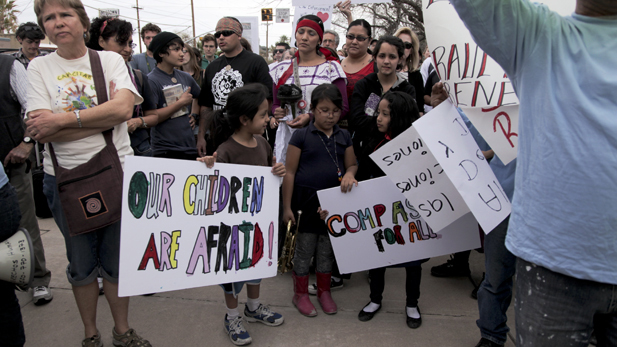 A group of about 100 people protest enforcement of SB 1070 outside of the Tucson Police Department in downtown Tucson in 2013.
A group of about 100 people protest enforcement of SB 1070 outside of the Tucson Police Department in downtown Tucson in 2013.SB 1070

Ten years ago the Arizona Legislature passed a bill that gave local police the responsibility to check the immigration status of residents during routine stops. Known by its legislative name, Senate Bill 1070, it quickly gained notoriety and widespread opposition from the Latino community and others around the country.
Then Gov.-Jan Brewer signed the measure into law in April 2010, saying it would make the state safer and promising it would not be used to racially profile people.
"We in Arizona have been more than patient waiting for Washington to act. But decades of federal inaction and misguided policy have created a dangerous and unacceptable situation,” Brewer said when she signed the bill.
The measure soon came to be known as the “show me your papers” law, and despite Brewer’s assurances, advocates warned it would inevitably lead to racial profiling.
Luige del Puerto was a statehouse reporter at the time the bill was passed. Now he's the editor and associate publisher of the Arizona Capitol Times and the Yellow Sheet Report. He said the passage of SB 1070 was not a surprise. Contemporaneous events like the economic crash and the death of a Douglas rancher painted the border as a dangerous place.
“At that point the passage of SB 1070 became certain,” del Puerto said.
That perfect storm of circumstances contributed to SB 1070 making it farther than any of the other similarly harsh enforcement bills that had been previously proposed. According to del Puerto, this also made it politically difficult for Brewer to veto the bill.
Several lawmakers who backed SB 1070 declined requests to be interviewed. Russell Pearce, the bill's main architect and sponsor, was recalled from office in November 2011.
Roberto Villaseñor was Tucson police chief when SB 1070 passed. The 35-year police veteran said that with the benefit of hindsight, he did not think the bill made Arizona any safer.
“It put local police in bad perspective, and I think it caused some division between communities and local police,” Villaseñor said. “And I really didn’t see that much of a benefit.”
Some of that strain between the Latino community in particular and law enforcement came from very vocal groups of people who were opposed to the bill, Villaseñor said. The department was accused of targeting Latinos and going on “raids” with federal immigration enforcement agencies, which Villaseñor firmly denied.
“We didn’t go out there looking for immigration violations,” Villaseñor said. “First off, because it’s a federal violation which we did not have the authority to enforce.”
Villaseñor did think that SB 1070 ultimately had a national impact because it brought the issue of unlawful immigration to the forefront of the national conversation.
Arizona's Latino community, especially young people, responded to SB 1070 with protests and demonstrations, objecting to what they saw as racial profiling.
SB 1070 was partially struck down by the Supreme Court two years after it was passed. But the bill’s effects did not necessarily end there. One lasting development was the creation of a new generation of Latino activists in Arizona.
Jose Patiño was a junior in college at Arizona State University when SB 1070 passed. He and some fellow student advocates were at the state Capitol when the bill was officially signed. He said emotions were high, with many people sad or angry. Patiño said the scene got chaotic and the police became involved. He was exhausted by the end of the night.
After the bill passed, Patiño continued to advocate for legislation to help undocumented youth.
Anakarina Rodriguez was also in college when SB 1070 became law. She said that she became afraid that her family and other Latinos would face discrimination.
“I remember it really lit a fire inside me that made me want to do something about it. It wasn’t until a couple years later that I decided to redirect my career and went into social work,” Rodriguez said.
After that career shift, she made connections with Latino empowerment organizations. Rodriguez now works with the National Association of Latino Elected Officials Educational Fund.
In 2010, Reyna Montoya was an undocumented student at ASU. Listening to professors dissect the law felt like hearing the cold mechanics of a measure that could profoundly change her own life.
"This is not a job for many of us. It’s just a way of us wanting to fundamentally change policies that have damaged our communities and our friends," she said.
Reyna Montoya is now a recipient of the Deferred Action for Childhood Arrivals program, or DACA, the Obama-era policy enacted in 2012 that gave some 800,000 undocumented immigrants temporary protection from deportation and a work permit.
In 2016, she founded Aliento, a nonprofit that works to address fear and trauma for mixed immigration status families. SB 1070 was her catalyst. Now, she said, she hopes to help a new generation find one, too.



By submitting your comments, you hereby give AZPM the right to post your comments and potentially use them in any other form of media operated by this institution.